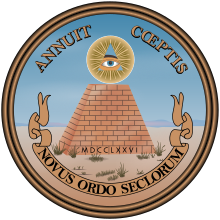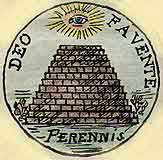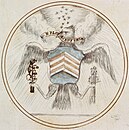Annuit cœptis

Annuit cœptis (
On the Great Seal

Barton explained that the motto alluded to the Eye of Providence: "Deo favente which alludes to the Eye in the Arms, meant for the Eye of Providence."[2] In western art, God is traditionally represented by the Eye of Providence, which principally symbolizes God's omniscience. In 1782,
Change from Deo Favente to Annuit Cœptis
When designing the final version of the Great Seal, Charles Thomson (a former Latin teacher) kept the pyramid and eye for the reverse side but replaced the two mottos, using Annuit Cœptis instead of Deo Favente and Novus ordo seclorum instead of Perennis. When he provided his official explanation of the meaning of this motto, he wrote:
The Eye over [the pyramid] and the motto Annuit Cœptis allude to the many signal interpositions of providence in favor of the American cause.[5]

Annuit Cœptis is translated by the
Does Annuit Cœptis refer to God?
A 2024 publication explores the question as to whether Annuit Coeptis makes reference to God, examining the claim that the founders of the United States were deliberate to avoid references to God by choosing only secular mottos.[10]
Classical source of the motto
According to Richard S. Patterson and Richardson Dougall, Annuit cœptis (meaning "He favours our undertakings") and the other motto on the reverse of the Great Seal,
The same language also occurred in an earlier poem of Virgil, the
Notes
See also
References
- ^ "Annuit Coeptis – Origin and Meaning of the Motto Above the Pyramid & Eye". greatseal.com.
- ^ Papers of the Continental Congress, item 23, folios 137–139.
- ^ MacArthur, John D. (2011). "Third Committee". Retrieved 11-25-2011.
- ^ "Third Committee's Design for the Great Seal – 1782". greatseal.com.
- ^ Journals of the Continental Congress, June 1782
- U.S. Department of State, Bureau of Public Affairs. 2003. Retrieved November 25, 2011.
- ^ Bureau of Engraving, Currency Notes
- ^ U.S. Treasury (2010). "Portraits & Designs". Retrieved 11-25-2011.
- ^ In The Oxford Handbook of Church and State in the United States. New York: Oxford University Press, 2010]
- ^ Gardiner, Richard. (2024). "Annuit Coeptis," AGC Journal (Spring 2024) Volume 4, No. 1, p. 13ff.
- Vergilius Maro, Publius (29–19 BC). Aeneid. Retrieved 11-25-2011.
Further reading
- Gardiner, Richard. (2024). "Annuit Coeptis," AGC Journal (Spring 2024) Volume 4, No. 1, p. 13ff.
- Patterson, Richard Sharpe; Dougall, Richardson (1978) [1976 i.e. 1978]. The Eagle and the Shield: A History of the Great Seal of the United States. Department and Foreign Service series ; 161 Department of State publication ; 8900. Washington : Office of the Historian, Bureau of Public Affairs, Dept. of State : for sale by the Supt. of Docs., U.S. Govt. Print. Off. OCLC 4268298.
External links
 Media related to Annuit coeptis at Wikimedia Commons
Media related to Annuit coeptis at Wikimedia Commons

